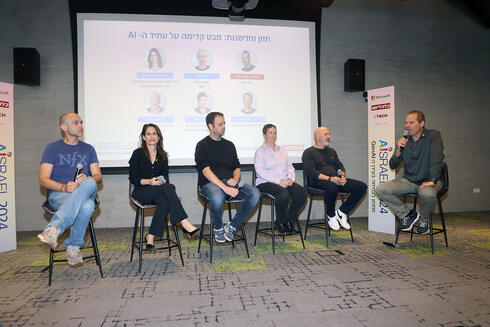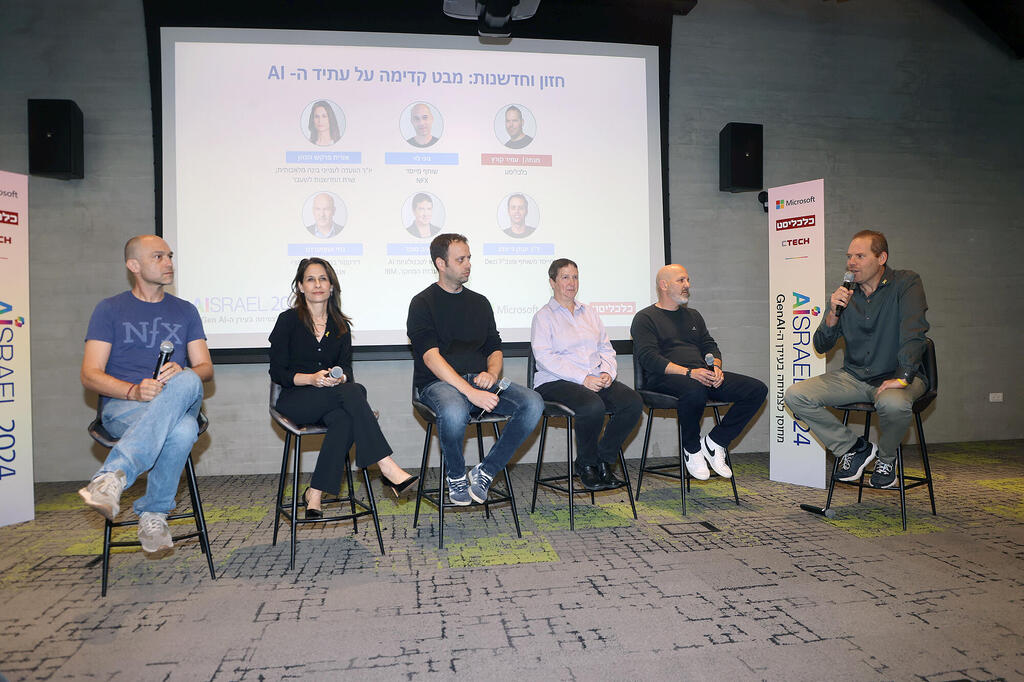
Gigi Levy-Weiss: "If we do not push to establish as many new companies as possible this year, we will pay for it for many years to come"
Levy-Weiss, General Partner at NFX, was speaking on a panel at Calcalist's AIsrael 2024 event held in collaboration with Microsoft. According to MK Orit Farkash-Hacohen, Chairman of the Committee on Artificial Intelligence and former Minister of Innovation: "I am very concerned, despite the rate of development of AI and the enormous challenges in the field, the government is not on top of it"
"Because of the terrible year that we experience at the same time as the explosion of AI in the world, there is a chance that we will not be able to close the gap" - these are the words Gigi Levy, a founding partner of NFX, chose to describe the cloud that is now hovering over the local ecosystem and concerns of Israel’s ability to integrate into the global artificial intelligence race.
Levy spoke as part of a panel dealing with the future of AI moderated by Calcalist reporter Amir Kurtz held as part of Calcalist's AIsrael 2024 event held in collaboration with Microsoft. Joining Levy on the panel was the chairperson of the committee for artificial intelligence and former minister of innovation MK Orit Farkash-Hacohen.
Also participating in the panel were Dr. Yonatan Geifman, co-founder and CEO of Deci AI; Dr. Aya Soffer, Vice President of AI Technologies and Director of the IBM Research Laboratory; and Nati Amsterdam, Senior Director and Regional Director at Nvidia Israel.
We've heard about the future of AI and the opportunities it represents, but there are also difficulties. MK Orit Farkash-Hacohen, how do you see the future of AI as far as Israel is concerned?
"I am concerned because I think that the pace of AI development along with what is happening in the world and the race on this issue is exposing Israel to enormous challenges, and the government is not on top of it. The issue is not on the agenda. At the government level there are challenges here that were not there before.
"If at the end of 2021, we, Israel, were in a different world after a record year for high-tech, in a relatively short period of time we would have moved up a level in the challenges that the breakthrough of AI. I do raise all this in the Knesset, but to be blunt - we are not on top of it."
The MK mentioned other challenges that require the attention of the Israeli government when it comes to AI: "There is, for example, the aspect of disinformation. TikTok, for example, has systematically blocked all content related to abductees since October 7, and there is the whole issue of Deep Fakes. From the data presented to us, 60% of the profiles created on social networks after October 7 are not authentic.
"Beyond that, a strong alliance was formed between Russia and Iran, which became extremely strong in technological aspects as well. The AI race is getting political. But while we are busy talking about responsible innovation and everyone is busy with AI ethics the other side is not committed to these values. It's an asymmetric war between a country that observes the rules of war and a country that doesn't."
The MK expressed concern about the current situation: "There is such an assumption of technological superiority of the Western bloc over the other bloc, and I think that because of the rate of development of AI that has removed so many barriers to the defense industries - this assumption can be dismantled very quickly. It has never been easier to lie and create existential threats to each other.
"I don't want to rain on the parade," she continued, "but not only are we not on top of it, I think the questions now are of a different magnitude. How is Israel preparing to maintain a technological advantage in this world, how is Israel preparing for the world of employment in the field of artificial intelligence? The AI race requires hardware, computing power, strategic collaborations and alliances so that tomorrow we don't wake up and there will be a technological embargo on Israel."
Gigi Levy-Weiss: “When it comes to the high-tech industry there is one layer of chips, another layer of cloud, and another layer of applications, cyber, DevOPS and more. Israel is not a major player in the world of chips, the cloud also belongs to the big boys and we will not be there. The place where we had to excel is the DevOPS and the applications, but we are at a very bad point there."
According to Levy, "We had a lost year in Israeli high-tech in 2023 and at the beginning of 2024. No one had the energy to start companies. While in a normal year 1,400 companies are founded in Israel, 400 companies were founded here in the past year. A hole was created that will be seen later in the companies that will raise money, and because this happened in the year where AI exploded, there is a great chance that we will not close the gap. We must make an effort to get companies in this field get started. If we do not push in 2024 to establish as many new companies as possible, we will pay for it for many years to come."
Dr. Aya Soffer, you know the issue well as both someone who was a member of a government committee on the issue and also from the industry side. Did we miss the boat?
"I completely agree with my predecessor, but I think time will tell. The biggest opportunity in the AI world is starting to develop because it's the top layer of AI tools and DevOPS and uses. This is a world that is just beginning. So in these worlds the opportunity exists. Will we be fast enough? I think we haven't missed the boat yet. We need to be quick, and the second thing we know from past cases - the more we use something, the more we know what needs to be developed there, and Israelis are relatively agile, and know what obstacles need to be overcome.
"Regarding barriers, what I see in the academy, and there we have a kind of problem because in this area where in the past Israel had a fairly significant lead in the field of AI relative to our size - we have been retreating in recent years and there are all kinds of reasons for this - numbers, investment , some standards, some faculty members, and also the story of the infrastructures. If you don't have a few thousand GPUs (processing units) you won't be able to run an article, and this is a topic that bothers me. How do we enable our researchers, members of the Israeli academy and smaller companies to remain at the forefront of research in this field."
Gigi Levy-Weiss: "In the end it's money and research. It's not a cheap field. You need tens of millions of dollars that institutions in Israel don't have and abroad they do have."
The impact on research and academia is a subject that you understand well, Dr. Geifman. Where are we in this matter?
"The talent in AI today comes from the academy and in this aspect I am optimistic. You hear a lot of Hebrew in many leading institutions in the world, and the state of talent in Israel in relation to the size of the industry is relatively fine. But there is a very great thirst and what is needed is professors at universities and budgets so that we continue to develop at the pace we have been at and the second thing that is needed is money. The entry of billions into Israel is supposed to improve the state of the local ecosystem in this context. I am relatively more optimistic about our ability to grasp this curve of exponential growth in the world."
Will our military and Unit 8200 continue to produce AI experts?
Dr. Geifman: "If we compare the previous decade to the next decade in terms of what the military produces, we will see many more AI experts than we saw in the previous decade, and this is a trend that will put us in a better place and allow us to catch up."
Nati Amsterdam, how can large international companies help us in this area?
"There is a lot of talent in Israel. Not only in academia and research. You see groups in hospitals, you see a lot of leading Israeli startups doing AI. What we do to help the ecosystem in Israel is investments in Israel. For example, the ISRAEL 1 supercomputer that we announced, beyond that, we make sure to work closely with the companies and researchers to help them use the technology.
"Over the years, I have seen the growth of AI, and it comes from that. If you want to train a model to train a language, you need access to technological capabilities. If I were to say one thing that I see as something that can be improved, it is to integrate the education of AI at an earlier stage. It needs to be integrated in high schools first. Invest in education. AI is here to stay for the long term."
Looking ahead, how will technology affect us?
Nati Amsterdam: "We see the whole industry changing. Let me give a few examples. In the health industry today we see genetic sequences and you can look for the potential for diseases in them. It is also possible to identify medical information in medical records. If I refer to other areas, this is creating a revolution in the areas of retail, finance, the personalization of banking, you see how every industry is changing, and under every system you need AI."
Gigi Levy-Weiss: "I vary between optimism and pessimism. The potential of AI for Israel is unimaginable. We have of the ability to move quickly, the talents, etc. On the one hand this makes us the best. On the other hand, when you look at government investment, the amount of new companies and finally how much foreign money does come in here - right now we are in a terrible drought in the last few quarters - we have to make sure it goes to the right place. This is everyone's responsibility - the entrepreneurs, the state, and if we don't come to our senses there is a chance we will miss it.
"At NFX we have set up a fund called FAST. We commit to giving money within nine days to encourage the creation of new companies and we all need to think about how we don't let the lost year hurts us. There is a great opportunity here that is essential for the future of the country."
MK Farkash-Hacohen: "This is an issue that must be at the top of the agenda of priorities, it should be in the prime minister's care. We are in complex times, and the more I dig deeper, this is an event that is strategic for the State of Israel and we must put it on the table."
Nati Amsterdam: "There is a great deal of intelligence here, and we need to help this industry accelerate what it does through academia and research and the global companies that operate here. There are over 300 development centers of global companies in Israel and Nvidia will continue to do that."















